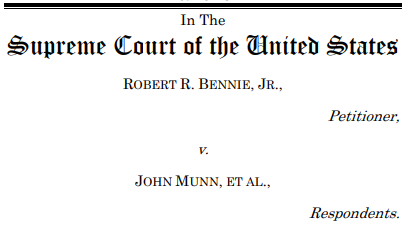The First Amendment protects an individual’s right to disagree with political leaders, and to associate with other like-minded citizens, even when one works in a heavily-regulated profession. Yet the Eighth Circuit has permitted Nebraska’s Department of Banking and Finance to target Petitioner in retribution for his political activities, directly and explicitly pressuring his private employer to control his political activities.
Nevertheless, and despite admitting that the standard of review was likely dispositive, Bennie v. Munn, 822 F.3d 392, 398 (8th Cir. 2016), the Eighth Circuit disregarded its duty to independently review the constitutional facts in this case. It neglected even the protections afforded by regular standards of review, failing to find abuse of discretion in the district court’s failure to consider Petitioner’s employment in a heavily-regulated profession, and failing to review de novo the district court’s misapplication of the ordinary firmness test.
In falling short of its duty of independent review, the Eighth Circuit failed to provide the protections, guaranteed by the First Amendment. That is unfortunate for Petitioner, of course, but it also undermines our national effort to build and sustain a thriving civil society. Such a society strengthens minorities and dissenting individuals, allowing them to protect themselves from the state and majorities acting outside the state. It is a catalyst for the diversity of ideas necessary for self-government. And the habit of association formed in such a society pulls us outside of our divergent individual concerns, and binds us together as a people.
The State’s attacks on Petitioners’ speech and associational freedoms, and the Eighth Circuit’s failure to properly police those attacks, consequently imperil interests of the highest importance. Certiorari is appropriate and should be granted.














